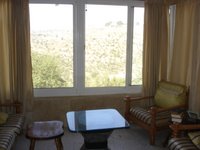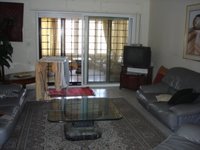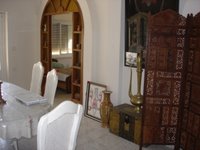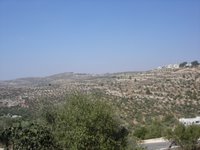One of the main features of life these days that people talk about is the strike. Schools and many government offices have been closed for a month since people haven't been paid since the beginning of the year. At the same time, a surprising number of government offices still are functioning. My neighbor, for example, works as a computer technician at one of the government ministries and has not been paid in 8 months. He said everyone, including himself, still shows up to work however, because if they do not, they will be replaced with new people since jobs these days are hard to come by.
Most people say they don't mind so much about the government office's languishing, (except for those who work for them and aren't getting salaries). The schools being closed, however, is another story. Kids are just staying at home and are getting restless. The only kids still going to school are those enrolled at private institutions. All our neighbor kids are roaming around the streets all day long with nothing to do.
I can't imagine American schools being closed for an entire month. People would be in an uproar. And yet, here, there is no end in sight to this madness. Indeed, there is a virtual war going on in the newspapers between Hamas and Fatah. Hamas won't back down, seeing that they were democratically elected. But, Fatah does not want Hamas to succeed. Fatah thinks if the occupation ends while Hamas is in power, this just emboldens Islamists. However, many Palestinians also believe it's also in Israel's best interest to preserve the status quo (i.e. Hamas in power), because that way Israel can justify squeezing Palestine for security reasons since Islamist extremists are in power, and the Palestinian society will become weaker and weaker and finally collapse. Moderate Palestinians bemoan the West's isolation of Palestine and Israel's oppressive force and tactics, saying this just emboldens extremists and those in favor of violent resistance.
Friday, September 29, 2006
Thursday, September 28, 2006
Pardon the delay...but it's Ramadan after all
The first week of fasting for Ramadan is the toughest, they say. For me, it was the first day. I hadn't woken up at 4am the way everyone does for the meal and morning prayers before the sun comes up. Essentially my thought process was as follows..."There's no way in heck I'm waking up in the dark in the middle of the night and stuffing my face and then going back to sleep." Well, after that day of a severely growling stomach and throbbing head, I decided I would see about this 4am meal idea. So, the past few days, my Japanese roommate and I both have woken up at 4am and eaten together in the dead of night and then gone back to bed. To be honest, fasting presents a comforting feeling of solidarity, not only with my roommate, but also with the whole community, since we know that everyone is doing likewise in their respective homes. That's one of the reasons my roommate and I decided to fast. It's such an important part of the local culture here and we wanted to experience it.
The holy month of Ramadan extends from the day that you first see the moon, which was exactly last Saturday and will extend until the moon disappears again and re-appears. The purpose of the fast, so I've been told, is two-fold: to commiserate with the poor, who do not have enough to eat or drink--as in, to actually feel those pains yourself. And also, to fast, from all unholy thoughts and actions. So, while the sun is up, it is "haram" (forbidden) to drink or eat anything, to smoke, or technically, to even swallow your saliva (chewing gum also forbidden, or course.) You're also not allowed to show physical affection to a member of the opposite sex. It's supposed to be a purifying time, in which you pray more and fast from the senses, and of course, get closer to God. The typical saying people express during Ramadan expresses this sentiment. You say, "Ramadan kareem", (Ramadan is generous), and the person responds, "Allah akram" (God is more generous).
The best part of the day for me has been al Iftar (breaking of the fast) at about 5:30 pm, where we've been invited to our neighbors' houses to join them for the meal. It's a joyous occasion, where everyone is relieved to be able to eat and drink as much as they can after a day of want. The food has been delicious and I've been promised cooking lessons so I can learn how to do it as well. After the meal, it's customary to go for a walk afterwards, so you see everyone around town in the evening. (During the day, on the other hand, Birzeit has been much quieter. Everyone is probably home napping!)
Ramadan takes on a completely alternate schedule that everyone adapts too, whether fasting or not. Even our class schedule has changed, so that people can go home earlier since everyone is pretty much "out of it" by about 3pm. The pace all in all, slows down. People walk slower, talk slower, etc.
Also, no one eats or drinks or smokes in public, even the Christians, out of respect for those fasting. It's amazing to think of all these hard-core smokers going without cigarettes during the day. Indeed, everyone I've talked to says not smoking is by far the hardest part of the fast. My neighbor told me during the year, he smokes two packs a day, but during Ramadan, he ends up smoking three packs a day, just because he misses it so much during the day and so smokes continually during the night. (I'm quite sure, that's not the point of Ramadan...to go without during the day so you can indulge at night, but oh well!)
Apparently, women must not fast during their "time of the month", so there is an extra week after the big Eid celebration after the end of Ramadan for women who have to make up their week and for those who were sick or travelling during the month and have days to make up.
So, we'll see how long I can last. The only big problem I've found is this new schedule has wreaked havoc with any kind of gym schedule. The women's gym in Birzeit doesn't open until 5pm (and only 3 days a week incidentally!) and closes at 8pm. Well, at 5pm, I'm way too weak and thirsty to go run and work out and after the huge meal, there's also no way I could get on a treadmill. Hmmm.....
Best wishes to all and hopes for a worldwide fast from want, sorrow, pain, anger, and injustice. :-)
The holy month of Ramadan extends from the day that you first see the moon, which was exactly last Saturday and will extend until the moon disappears again and re-appears. The purpose of the fast, so I've been told, is two-fold: to commiserate with the poor, who do not have enough to eat or drink--as in, to actually feel those pains yourself. And also, to fast, from all unholy thoughts and actions. So, while the sun is up, it is "haram" (forbidden) to drink or eat anything, to smoke, or technically, to even swallow your saliva (chewing gum also forbidden, or course.) You're also not allowed to show physical affection to a member of the opposite sex. It's supposed to be a purifying time, in which you pray more and fast from the senses, and of course, get closer to God. The typical saying people express during Ramadan expresses this sentiment. You say, "Ramadan kareem", (Ramadan is generous), and the person responds, "Allah akram" (God is more generous).
The best part of the day for me has been al Iftar (breaking of the fast) at about 5:30 pm, where we've been invited to our neighbors' houses to join them for the meal. It's a joyous occasion, where everyone is relieved to be able to eat and drink as much as they can after a day of want. The food has been delicious and I've been promised cooking lessons so I can learn how to do it as well. After the meal, it's customary to go for a walk afterwards, so you see everyone around town in the evening. (During the day, on the other hand, Birzeit has been much quieter. Everyone is probably home napping!)
Ramadan takes on a completely alternate schedule that everyone adapts too, whether fasting or not. Even our class schedule has changed, so that people can go home earlier since everyone is pretty much "out of it" by about 3pm. The pace all in all, slows down. People walk slower, talk slower, etc.
Also, no one eats or drinks or smokes in public, even the Christians, out of respect for those fasting. It's amazing to think of all these hard-core smokers going without cigarettes during the day. Indeed, everyone I've talked to says not smoking is by far the hardest part of the fast. My neighbor told me during the year, he smokes two packs a day, but during Ramadan, he ends up smoking three packs a day, just because he misses it so much during the day and so smokes continually during the night. (I'm quite sure, that's not the point of Ramadan...to go without during the day so you can indulge at night, but oh well!)
Apparently, women must not fast during their "time of the month", so there is an extra week after the big Eid celebration after the end of Ramadan for women who have to make up their week and for those who were sick or travelling during the month and have days to make up.
So, we'll see how long I can last. The only big problem I've found is this new schedule has wreaked havoc with any kind of gym schedule. The women's gym in Birzeit doesn't open until 5pm (and only 3 days a week incidentally!) and closes at 8pm. Well, at 5pm, I'm way too weak and thirsty to go run and work out and after the huge meal, there's also no way I could get on a treadmill. Hmmm.....
Best wishes to all and hopes for a worldwide fast from want, sorrow, pain, anger, and injustice. :-)
Monday, September 18, 2006
Between a rock and a hard place
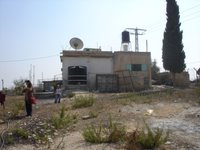
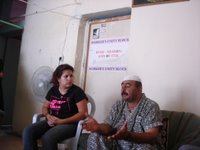
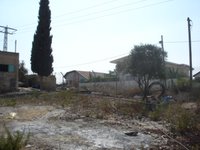
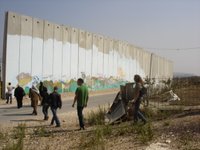
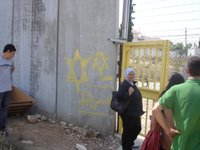
After the morning tour of the wall under construction, we went to visit a family who literally lived between a rock and a hard place. They were a Palestinian family whose house was between a settlement and the wall. To see them, we had to walk up to the wall and yell for them through the fence. As we approached, Israeli cameras noticed our presence and an armored humvee drove up to see what was going on. The father of the family came and unlocked the gate and ushered us in. The humvee just sat there and didn't bother us, thank goodness. (The Mother said that often the soldiers will not allow them to have visitors.)
We walked up to this decrepit house whose sole view was that of the large, domineering wall, that recently had been painted in bright colors by a local NGO. (We later met with the NGO who said they had been warned by the Israeli soldiers to stop painting or they would be shot, but they didn't stop and the soldiers eventually left them alone.)
Once inside the house, the Father sat in the head chair (framed by a large poster that said "Bush-Sharon: Axis of Evil") and told us his family's story.
The Israelis when they first started building the wall told them they had to leave, but the family refused. The family used to have a large greenhouse and a chicken farm which were all destroyed by the soldiers. One one side of the house is a large fence with barbed wire that separates their house from the settlement, which of course they are never allowed to enter. In fact, their house is often stoned and vandalized by settlers and their kids taunted. The only way for them to visit the neighboring Palestinian village on the other side of the wall is with the key to a small fence (through which we entered), but they cannot enter or leave if the outside gate is closed. They never know when it is or it isn't. They are allowed family visitors only and sometimes not even that, depending on the mood of the soldiers. They have no livelihood anymore, and their youngest son, now 6 has severe mental problems and anxiety. They attribute it to having grown up with the only view and life of a wall and barbed wire. Their other children don't like to come home and try to stay out as late as possible. When asked how long they can cope like this, the Father replied that they had lived like this for 3 years and would hold out as long as they could as a matter of principle. He said, "I'm a humble man, not powerful. If I had power, I would fight the Israeli government and take back our land. But this is all I can do."
It was interesting to hear him rail against the Israeli and American government for pursuing such unjust policies and actions, but he was careful to always distinguish between the people and the governments. He said, for example, he didn't even have a problem with the settlers because they were a product of the policies of the governments.
Needless to say, their predicament was shocking and depressing. The more I learn about the occupation, the more I understand the huge mistake the US made when we officially called our presence in Iraq an occupation. Also, although the overall situation is nothing at all alike, I see the difficulties our checkpoints and searches and road closures in Iraq have made. We are acting just like the Israelis. I remember seeing on the news in Iraq images of US checkpoints or troops patrolling the streets in Iraq and then immediately they would pan to images of Israelis and Palestinians. Indeed, in that way, the similarities are devastating. It is the dehumanization, annoyance, irritation, humiliation of people at will and at whim.
The Wall in Construction
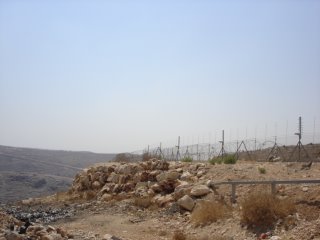
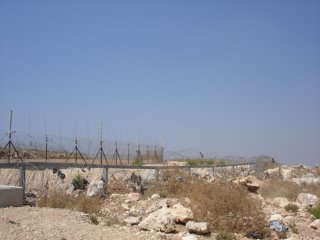
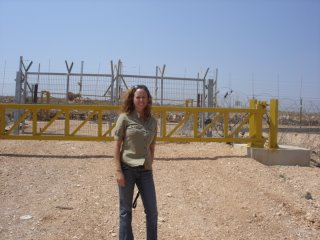
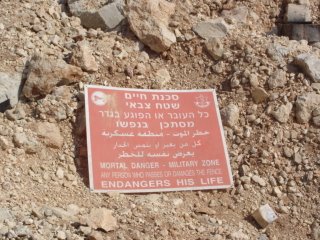
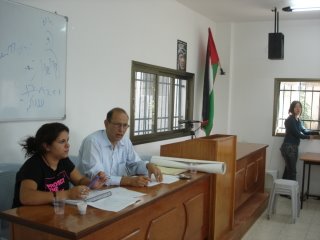
Yesterday was a long, depressing, and exhausting day. The University organized a trip for us to a village called Der Baloot, about 20 km from Tel Aviv that will soon be nearly encircled by the wall and checkpoints. It took us about an hour to get there since Palestinians have to take out of the way roads and go through checkpoints. We first met with the mayor of Der Balloot, who shared with us some problems in his village.
Der Balloot is a village near the green line (that separates Israel from the West Bank), 270 meters above sea level. In 1948, the town lost 15,000 dunums (1 dunum =1000 metres) of the best land. Since the building of the wall, it has lost another 10,000 dunums. Since the economy is based on agriculture, this is having devastating effects on the village.
There are also ancient Roman sites and monuments and churches in the proximity that Palestinians can no longer go to because of settlements that have been built.
In addition, DB villagers had nearly completed the building of a new primary school when Israelis said they had to stop it because it was too close to the proposed wall. The mayor described the lack of a genuine childhood or time of innocence for children who grow up in an environment that is like a prison with checkpoints and soldiers.
The Israeli checkpoint outside Der Ballout was set up in 1989, through which everyone passing must go through extensive searches. Getting through depends on the soldiers’ mood—villagers told us they feel they have no control over their lives. The humiliation, waiting for hours are an everyday experience. Plus, it is difficult for them to get jobs because one never knows how long the wait will be at the checkpoints.
Some other points:
--Israeli settlements in the West Bank (illegal under international law) block Palestinian villages from each other. Palestinians have to use different roads (blocked access) and go through checkpoints that close as early as 4 pm.
--Israelis seize any land they want under the pretense of "security reasons". This means where there is fertile farmland, good views atop hills or natural waterwells, the Israelis have seized to build settlements and deprived Palestinians use of their own land. Then the Israelis build roads to connect these settlements together (roads which the Palestinians can't use) and divide Palestinian areas from each other. In many settlements, Israelis don’t even live there. We passed by one on the way to Der Ballout that is only used on the Jewish sabbath day. When they build a settlement, they build 100 houses even if no one lives there in order to show EU and US that there’s a community there that they can’t move.
--Palestinians living outside checkpoints can't get in to the villages even for emergencies if it’s closed or the line is long. Later in the afternoon, we met a women's NGO that had documented dozens of cases of people dying who needed emergency care and dozens of women who had given birth waiting at checkpoints. The majority of children born in those situations have died.
Another villager shared...“For Palestinians, life is all questions and no answers”. This guy had travelled extensively throughout Europe and the US, and found it difficult to reconcile why Palestinians had such a poor lot. "Where are the ethics? What did they do to deserve this? But we have to just keep going." (Incidentally, a figure I read was that 70% of Palestinians under the poverty line, yet over 90% are literate, one of the highest rates in the ME.)
The wall Israelis are building near the town will be completed by end of year. 20,000 olive trees will be lost and Palestinians will be permanently separated from each other and the outside world, even more drastically than from the effects of the checkpoints. The mayor lamented, "These are not mere difficulties: this is killing."
To these presentations, the students in our program frequently ask, “what can we do? How can we help?"
One villager had an interesting response, “Tell the story. Just tell the truth of what you saw. Counteract the media distortion: that there are for example, no problems here between Christians and Muslims. That we have no problem with Jewish people...our problem is with the people who take our land and oppress us. This is not about religion; this is about the extreme damage politics does to religion...whether al Qa'ida, Zionism, or George Bush. I don't know why God decided to send all the prophets to our land, maybe just to make our life difficult. I've seen the Rocky Mountains; they are so high, so close to God. Why not there???"
Tel Aviv Protest
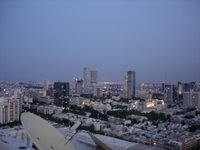
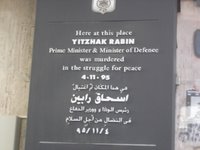
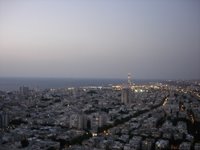
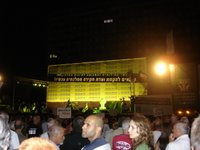

Ah, the big city...!! Last weekend some friends and I went to Tel Aviv to go to the beach before it gets cold. We were wrongly thinking that the climate in Tel Aviv is similar to Birzeit where it's already cooling down significantly in the evenings. But we realized as we made our way down to Tel Aviv that the whole two and a half hours, you are going down, down, down. Silly me, I had left my passport at home so I was frantically making up a story in my mind about how to plead with the Israeli guards at the checkpoint to let me though. Thankfully, this time it was a young guy who would undoubtedly have been denied entrance to a rated R movie, and he looked scared to death. He barely glanced at my driver’s license and didn’t even ask to see a passport, so we were home free!
In Tel Aviv, we first stopped by the huge apartment of an American guy who works for USAID. He’s the friend of a friend and offered me to stay the weekend at his place. He recounted the frustrations of his job at USAID ever since Hamas won the elections. He’s responsible for funding projects for the West Bank and Gaza and since the USAID has stopped all funding since Hamas won the elections, he literally has nothing to do. Interestingly, he mentioned how difficult it is to make friends in Tel Aviv if one is not Jewish and doesn’t speak Hebrew.
The view of Tel Aviv from his apartment building was stunning and the city looks very beautiful at night. (see pictures!) During the day, however, the city is suprisingly dingy and run-down. There’s also not much to do besides the beach.
As we left my friend’s apartment, we noticed policemen lining the streets and some roads blocked. It turns out a massive protest against the management of the war against Lebanon was being held a block away. We went over there to see what it was about and got in some interesting conversations with Israelis. Most were there because they disagreed not with going to war against Lebanon but with the execution of the war. One lady said, “I don’t feel any safer today than yesterday. They said they would get rid of Hizballah; they didn’t. They said they would get back the two soldiers and they didn’t. This is not right I'm no general but I know they should have managed this better!”
We then got in a conversation about the settlements with this lady and her son. Her son said the Arabs simply have to go; it is the Jews' land. At least he said they should probably be compensated for the land. The Mother was against the settlements, but said that any state settlement must include all of Jerusalem for Israel for "historical purposes". The next day we had a conversation with a guy with long dredlocks at an ice cream stop, whose grandparents had emigrated to Israel from Morrocco. “But I don’t speak a word of Arabic and I hate Arabs”, he said. “Why?” I asked. “Long story, if you grow up in Israel, you of course hate Arabs.” He said he was born in Jerusalem but much preferred living in Tel Aviv because life is freer and you can do and dress anyway you like. It was pretty shocking to hear that kind of mindset emanating from even the most chill hippie dude on the street.
After the protest, we had delicious Thai food and went to a bar on the beach that was blaring hip-hop music. It was surreal…we all felt like Tel Aviv was in a bubble. My American friend agreed…he said you would have never even known that a war was going on last month because life just continued apace in Tel Aviv. The only way one had an idea were the constant warships passing by the beach. Surreal, indeed.
After a lovely day at the beach and some shopping for things we can’t get in the West Bank, we wearily boarded the bus back to Jerusalem. I was eager to get back home. I had missed it!
Tuesday, September 12, 2006
Settling in...
Well, I've settled into a routine somewhat here in Birzeit. I have class every day except Friday and Sunday (the two holidays in the Palestinian territories, to recognize the Muslim and Christian holy days.) Every morning I walk about 10 minutes to the main circle of Birzeit, take the bus to the University, which only costs a shekel and a half. Palestine uses three currencies: shekels, Jordanian dinars, and dollars, but shekels are by far the most widely used. I've heard many complain that they're not allowed their own currency, but that will happen if the two-state plan comes into effect, I'm sure. It's very ironic that Palestinians are using money stamped with menorahs and Jewish leaders. Anyway, I digress.
The University is packed with students. It's only about 6,000 but it's a tiny campus so the effect in the cafeteria or in the main gathering area is one of a mob of students. I'm continually intrigued with the two different types of girls on campus. There are largely two extremes: those that do not wear a headscarf and have skin tight shirt and jeans, high heels, and lots of make-up; and those that have the headscarf and an overcoat falling all the way to the ground that hides any body outline. These two groups rarely, if ever mingle with each other. In fact, there are even different cafeterias on campus, one which is known as the more Islamic one and one that is the more liberal one. Of course, there are exceptions, those girls who wear a headscarf but Western style clothes and those that are in Western style clothes but not skin-tight. And there are groups which include girls that are covered and uncovered, but these are strikingly less. I think it's not healthy to have such extremes, but I haven't observed enough to know in what ways. It's just a feeling I get.
Some other trends...EVERYONE (well, every guy) smokes here, in the halls, in the cafeteria, in the offices, in the restaurants. It is intolerable! We went out the other night to a jazz concert and I had to leave every five minutes because my eyes were streaming tears due to the smoke. I've seen many young boys even smoking. The other day we visited our neighbors and their young son of 10 years old lit up the hookah pipe, which is even stronger than cigarettes.
By the way, I love our neighbors who live across the street. They are about 8, all cramped into a tiny apartment. Nearly every night the young ones come over to get help with their English homework. (The older girls want to but can't come over since there are men who live above us and apparently it's not appropriate to be seen by them after dark.) The kids are so sweet and patient with my Arabic. I realized kids are perfect to practice with because they are so patient and they don't speak English!
On the other hand, the guys who live above us are slightly annoying. They are like bodyguards, tracking who comes over and when and always popping in unannounced. They will not allow us to have male visitors after dark, not even to do homework or hang out. They say it reflects badly on the whole building and one of their sister's lives in the building. Okay, understandable, but still, it gets dark at 6:30, which is often when I get home and start my homework. I guess I should just realize that it is their way of looking out for us as well. At least I feel incredibly safe with them around!
Okay, off to class...
The University is packed with students. It's only about 6,000 but it's a tiny campus so the effect in the cafeteria or in the main gathering area is one of a mob of students. I'm continually intrigued with the two different types of girls on campus. There are largely two extremes: those that do not wear a headscarf and have skin tight shirt and jeans, high heels, and lots of make-up; and those that have the headscarf and an overcoat falling all the way to the ground that hides any body outline. These two groups rarely, if ever mingle with each other. In fact, there are even different cafeterias on campus, one which is known as the more Islamic one and one that is the more liberal one. Of course, there are exceptions, those girls who wear a headscarf but Western style clothes and those that are in Western style clothes but not skin-tight. And there are groups which include girls that are covered and uncovered, but these are strikingly less. I think it's not healthy to have such extremes, but I haven't observed enough to know in what ways. It's just a feeling I get.
Some other trends...EVERYONE (well, every guy) smokes here, in the halls, in the cafeteria, in the offices, in the restaurants. It is intolerable! We went out the other night to a jazz concert and I had to leave every five minutes because my eyes were streaming tears due to the smoke. I've seen many young boys even smoking. The other day we visited our neighbors and their young son of 10 years old lit up the hookah pipe, which is even stronger than cigarettes.
By the way, I love our neighbors who live across the street. They are about 8, all cramped into a tiny apartment. Nearly every night the young ones come over to get help with their English homework. (The older girls want to but can't come over since there are men who live above us and apparently it's not appropriate to be seen by them after dark.) The kids are so sweet and patient with my Arabic. I realized kids are perfect to practice with because they are so patient and they don't speak English!
On the other hand, the guys who live above us are slightly annoying. They are like bodyguards, tracking who comes over and when and always popping in unannounced. They will not allow us to have male visitors after dark, not even to do homework or hang out. They say it reflects badly on the whole building and one of their sister's lives in the building. Okay, understandable, but still, it gets dark at 6:30, which is often when I get home and start my homework. I guess I should just realize that it is their way of looking out for us as well. At least I feel incredibly safe with them around!
Okay, off to class...
Thursday, September 07, 2006
The Wall Between Us
Two days ago I spent the day in Jerusalem. It was amazingly easy. From campus, I took the bus to Ramallah and then a direct bus to Jerusalem (only for Jerusalem residents and foreigners). Others have to go through a lengthy search and checkpoint via a different route. The drive took 40 minutes or so, and much of it was all along the infamous wall that Israel has built between it and the Palestinian territories. The “fence” as some Israelis call it, is a HUGE, very permanent structure in look and feel and surrounded in barbed wire, lights, and communication posts. The Palestinian side is littered with graffiti. My first thought was that it looked like a prison. Then I realized that it looked just like the protective barriers around the green zone, except this one was much higher.
It was quite surreal to be driving in what felt like a huge prison and to see kids near the wall and normal life proceeding apace. I couldn’t imagine what these kids felt and thought having grown up with this.
The wall is a constant topic among Palestinians and there are regular demonstrations and protests on parts of the wall Israel is still building. In many parts, the wall has separated Palestinians from their families, farmers from their farmland and has cut through large swaths of what is considered Palestinian territory. It also presents a psychological barrier for Palestinians to the outside world and a symbol for a deep-seated resentment towards Israel. There’s nothing like a wall to create a clearly defined and delineated divide—a barrier to interaction, communication, understanding, collaboration—all such necessary qualities for a community, relations, and especially, peace…
As we drove up to the checkpoint and approached the soldiers, I felt this strange feeling of shame or guilt mixed with fear. Like I had done something wrong but I knew I hadn’t, like I was one of the accused. And that created a feeling of resentment and anger because I knew I wasn’t, that I had every right to be travelling there. This feeling intensified when the soldier boarded our bus and checked everyone’s identity cards. He gave me a hard time because apparently the official who questioned me at the airport hadn’t given me any paper indicating I had a visa for Israel. In the end, he let me go, but I have no idea how to move around Israel with no visa!
In Jerusalem, I met up with several friends for the day and walked around both East Jerusalem (the Arab side) and West Jerusalem. The differences were amazing. East jerusalem is a lot like Ramallah, as in chaotic and cramped, with goods and people spillling on to the streets. West Jerusalem is incredibly green, spacious, orderly, modern. I gawked at the change in dress, tank tops, short skirts. My Israeli Jewish friend with whom I spent the afternoon, said the two parts of the city are truly “different worlds”. In East Jerusalem, I was the only tourist that I saw and I was stopped by Israeli special forces, who asked me where I was from and what I was doing there. My Arab friend later told me these forces have free reign in Arab areas and he and all his friends are terrified of them. They can question, imprison, intimidate anyone they want with impunity.
As usual, I had lots of conversations about politics. In West Jerusalem, I talked with some folks in a restaurant who talked about the huge change in the relationship since the first intifadah, how they used to be able to travel freely to the Palestinian areas and vice versa and regularly enjoyed going to Ramallah. Now, Israelis are forbidden by the Israeli government to travel to the West Bank (for their safety, they say) and Palestinians are likewise forbidden to enter.
The owner of the restaurant however, was the first truly optimistice person I’d heard. He believed people would soon tire of fighting, two states would emerge, and over time would develop normal relations with each other.
On the other side, my Arab friend from Jerusalem and I talked about Hamas. I questioned why Hamas was so dumb as to refuse to recognize Israel’s right to exist. Israel is smart, I said. They may in reality continue to deny Palestinians territory, rights, and want the whole land themselves, but they don’t say that. Hamas on the other hand has no ability to destroy or make war against Israel, but they say something so outrageous that the international community could never accept. I was dumbfounded when he got very agitated at this. We don’t recognize their right to exist! They’ve only been around 50 years. Somehow, with weapons or resistance or even God’s help, we will kick them out because they kicked us out. This is not their land. Sigh, back to square one.
As an aside, on this topic of saying vs. doing, I thought that it’s interesting that in the West we are accustomed to believing what our government says. In the Middle East, however, there is so much propaganda and conspiracy theories that no one believes what governments or politicians say, they look much more to actions. (Conspiracy was actually the first Arabic word I learned in Iraq!) This different perspective gets both sides in trouble. For example, in Iraq, the US seemed to believe what politicians said, (especially if they spoke to us in English), rather than what they were actually doing on the ground. Meanwhile, we also think in regards to our own actions, “Well, we’ll just tell them the truth, tell them what we want to do, why we’re here.” This didn’t really matter, because what Iraqis saw was so different than our words of democracy and development.
It was quite surreal to be driving in what felt like a huge prison and to see kids near the wall and normal life proceeding apace. I couldn’t imagine what these kids felt and thought having grown up with this.
The wall is a constant topic among Palestinians and there are regular demonstrations and protests on parts of the wall Israel is still building. In many parts, the wall has separated Palestinians from their families, farmers from their farmland and has cut through large swaths of what is considered Palestinian territory. It also presents a psychological barrier for Palestinians to the outside world and a symbol for a deep-seated resentment towards Israel. There’s nothing like a wall to create a clearly defined and delineated divide—a barrier to interaction, communication, understanding, collaboration—all such necessary qualities for a community, relations, and especially, peace…
As we drove up to the checkpoint and approached the soldiers, I felt this strange feeling of shame or guilt mixed with fear. Like I had done something wrong but I knew I hadn’t, like I was one of the accused. And that created a feeling of resentment and anger because I knew I wasn’t, that I had every right to be travelling there. This feeling intensified when the soldier boarded our bus and checked everyone’s identity cards. He gave me a hard time because apparently the official who questioned me at the airport hadn’t given me any paper indicating I had a visa for Israel. In the end, he let me go, but I have no idea how to move around Israel with no visa!
In Jerusalem, I met up with several friends for the day and walked around both East Jerusalem (the Arab side) and West Jerusalem. The differences were amazing. East jerusalem is a lot like Ramallah, as in chaotic and cramped, with goods and people spillling on to the streets. West Jerusalem is incredibly green, spacious, orderly, modern. I gawked at the change in dress, tank tops, short skirts. My Israeli Jewish friend with whom I spent the afternoon, said the two parts of the city are truly “different worlds”. In East Jerusalem, I was the only tourist that I saw and I was stopped by Israeli special forces, who asked me where I was from and what I was doing there. My Arab friend later told me these forces have free reign in Arab areas and he and all his friends are terrified of them. They can question, imprison, intimidate anyone they want with impunity.
As usual, I had lots of conversations about politics. In West Jerusalem, I talked with some folks in a restaurant who talked about the huge change in the relationship since the first intifadah, how they used to be able to travel freely to the Palestinian areas and vice versa and regularly enjoyed going to Ramallah. Now, Israelis are forbidden by the Israeli government to travel to the West Bank (for their safety, they say) and Palestinians are likewise forbidden to enter.
The owner of the restaurant however, was the first truly optimistice person I’d heard. He believed people would soon tire of fighting, two states would emerge, and over time would develop normal relations with each other.
On the other side, my Arab friend from Jerusalem and I talked about Hamas. I questioned why Hamas was so dumb as to refuse to recognize Israel’s right to exist. Israel is smart, I said. They may in reality continue to deny Palestinians territory, rights, and want the whole land themselves, but they don’t say that. Hamas on the other hand has no ability to destroy or make war against Israel, but they say something so outrageous that the international community could never accept. I was dumbfounded when he got very agitated at this. We don’t recognize their right to exist! They’ve only been around 50 years. Somehow, with weapons or resistance or even God’s help, we will kick them out because they kicked us out. This is not their land. Sigh, back to square one.
As an aside, on this topic of saying vs. doing, I thought that it’s interesting that in the West we are accustomed to believing what our government says. In the Middle East, however, there is so much propaganda and conspiracy theories that no one believes what governments or politicians say, they look much more to actions. (Conspiracy was actually the first Arabic word I learned in Iraq!) This different perspective gets both sides in trouble. For example, in Iraq, the US seemed to believe what politicians said, (especially if they spoke to us in English), rather than what they were actually doing on the ground. Meanwhile, we also think in regards to our own actions, “Well, we’ll just tell them the truth, tell them what we want to do, why we’re here.” This didn’t really matter, because what Iraqis saw was so different than our words of democracy and development.
Monday, September 04, 2006
Pictures of Birzeit University and Old City



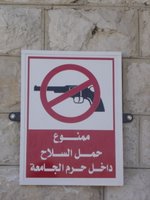
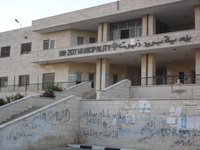
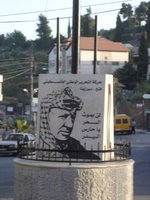
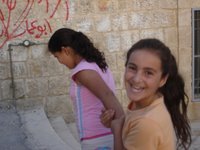
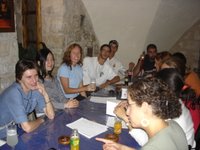

1.) Birzeit U. track
2.) BU Engineering building (the largest major on campus)
3.) Important Notice at the entrance of campus!
4.) Birzeit City Hall
5.) Main circle in Birzeit where we catch the bus to school.
6.) Kids in the old city having fun.
7.) PAS students at a local restaurant
8.) Old city street (The newest building is 200 years old, acc. to our guide. He also said there are always a lot more problems in the old parts of cities between Israeli soldiers and Palestinian opponents because there are many tunnels and hide-aways left over from long ago.)
Pictures of Birzeit and our house
Friday, September 01, 2006
And I thought Iraqi politics were complicated...
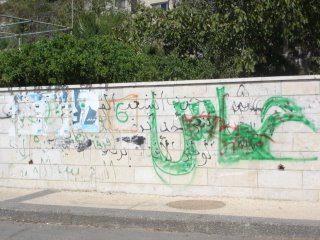
Everywhere around my neighborhood the word "Hamas" is spray-painted in green and the posters of Fatah are defaced. I found that surprising since Birzeit is a moderate and half-Christian town. I've been canvassing the Palestinians I've met about the political situation--a group that includes individuals at a refugee camp we visited, our various guides, and professors and students at school.
Here are some preliminary views I've heard.
1.) Palestinians voted for Hamas, even long-time Fatah members, mainly to "get back" at Fatah for its corruption, mafia-like leadership style, and the fact that the party had done so little for the Palestinians. Some Palestinians, of course, favored Hamas' more militant style, since they believed Fatah's failure made it clear that nothing can be gained by cooperating at every point with the Israelis because it means Palestinians just get taken advantage of. With Fatah, Palestinians saw more of their land taken, more stringent security procedures, more frequent incursions and campaigns into their areas, and finally, being cut off from the world with the wall.
Incidentally, Hamas parliamentarians and ministers are the only ones who have received any salaries the past 6 months. The others have received nada, since the West cut off funding to the PA. The Palestinians with whom I spoke believed the money was coming from Iran and/or Syria, and that it was obvious that Hamas was very well-funded. (I don't quite understand the West's logic. Hamas' ability to "take care of their own" and buy support in a society in serious need of finances will just increase the party's standing. Everyone was outraged about the West's cutting off aid as not hurting Hamas, whom they intended to punish, but hurting the Palestinian people. The Palestinians were not blaming Hamas, but the West, for this worsened condition. We did similarly in Iraq, stood by as the Iranians heavily funded the Shia Islamists parties. Meanwhile, the moderate democrats there pleaded for support and funding and we didn't do anything because we "didn't want to interfere". And we wonder why Islamists won the elections?)
2.) Most saw the two-state solution as the best of the all bad options. "We MUST have our freedom," they all exclaimed. They all agreed living under occupation was like living in a prison and was inhumane and unbearable. A two-state solution would at least give them sovereignty within their areas.
3.) Most believed it just that the "right of return" meant that Palestinians who could prove their land holdings in Israel should be allowed to get their land back or be compensated. However, they were sure a two-state solution would mean compromise on this point and they would be satisfied with the "right of return" for Palestinians outside the territories to return home.
4.) The students I talked to, interestingly, all said that the only way to accomplish these goals was through militant resistance, since past experience had shown Israel would not respond to anything else. I didn't get clear answers from the older folks. (Not a good trend if the youth are getting farther and farther apart, and more and more militant.) The students pointed out that all the parties call for resistance (even leftist parties, such as the PFLP and Communists). There is only one leader (I can't remember his name!) who does not and he is regarded as a buffoon by most Palestinians and has very little support even though he is heavily funded by the EU. I asked the students why smart, moderate individuals like themselves didn't start a party and they laughed. I'm going to keep pressing!
As another aside about students and politics, the Public Relations head officer of Birzeit said the students are extremely politicized. Their student council is voted upon by party: for example, Hamas won the majority of seats on the council last year and Fatah the second highest. I asked if they ever collaborate on activities or if this means that most of their activities are political in nature. He said that they do collaborate on protests about school fees or issues, or against the occupation. However, most issues become political. He did not think that the student groups received financial or other support from the parties themselves. (I find this highly doubtful; this was a big problem in Iraq.)
5.) Gaza is much more radical politically than the West Bank because they are much more economically impoverished and isolated. A girl in our program is Palestinian-German, originally from Gaza, and went there for a while before coming to Birzeit. Her description paralleled Iraq: intermittent electricity and water, daily shootings and killings, very Islamist.
Okay, off to Ramallah to hear a jazz concert. Contrary to the news, Ramallah is a very happening and fun city! Classes start tomorrow... Oh yeah, and I got my first proposal last night from our neighbor (23 and owns a supermarket across the street. Yes, Justin, I refused him, of course! I said he was just a boy and I was way too old for him!)
Subscribe to:
Posts (Atom)


